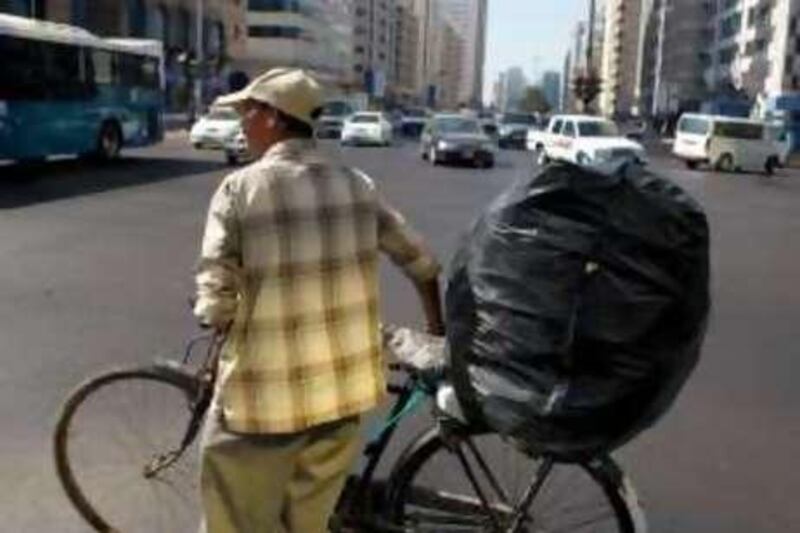ABU Dhabi // Cycling through the streets of Abu Dhabi is not for the faint-hearted. Without designated bike lanes, cyclists are forced to risk sharing the roads with drivers or ride on footpaths - if there are any. But city cyclists have not been able to agree on how to improve a situation in which they are hemmed in by roads and traffic policies and treated with contempt by motorists. There are two types of cyclists in Abu Dhabi, said Martyn White, a member of a group of cyclists who head off every Friday at 5am and cycle up to 120km. There are people like himself, for whom cycling is a serious activity in which all safety precautions are taken and every law of the road obeyed. Mr White said there was another group who loaded their bikes with boxes, obstructing their vision. These riders had no respect for the road, he said, often riding against traffic and turning without signalling. The only designated bicycle lane is along the Corniche. "The Corniche is not good enough," Mr White said. "The bike lane there is always covered in fallen branches and other debris. And it's not very long. And you have to share it with joggers. "We go out at 5am because any later and there is simply no way around Abu Dhabi - nowhere safe, anyway." Those who use bikes for transport, as an alternative to the car, also do not have anywhere to ride. A cycling network has been proposed in Abu Dhabi's 2030 Urban Structure Framework Plan, to be extended through Al Ain and Al Gharbia. Guidelines for a new street network in Abu Dhabi, being developed by the Urban Planning Council (UPC) and the Department of Transport, have included a cycle path network. "Cycling is a practical mode of transport for medium-distance trips," Fouad Kassem, the public affairs manager for the UPC, said. "The capital city district will incorporate a substantial and connected cycling network. It is important to develop an initial practical network of safe bicycle routes before cycling is promoted." Mr White was not convinced lanes would greatly improve the situation for cyclists. "I've been here since 1992 and trust me, you will never change the attitude of the drivers here," he said. "You will never get them to respect cyclists. You can't even get them to respect the speed limit. I applaud anyone who wants to try. "The roads are already so congested, I don't think a bike lane would be too safe. There's probably a better chance at pushing for a bus lane." Sahar Kn uses his bicycle to deliver fruit to his customers in Abu Dhabi. "Thank goodness I have not been in an accident. Drivers don't respect bikers," Mr Kn said. "It is not safe here. I don't go too far when I am delivering because it is difficult. Too many cars. "We need bike lanes, that would make it safer. If it was safer, more people would bike." Jarjeet Kumar's bicycle is a rusted military green which has clearly seen better days. When asked about how he finds cycling on the streets of Abu Dhabi, Mr Kumar misunderstands and begins to apologise profusely, explaining that he had heard cycling was illegal but he was only bringing lunch back to the laundry shop where he works. He will not cycle again, he says sincerely. While it is in fact illegal to cycle through the city's parks - a measure to protect park flora and fauna - Mr Kumar's reaction speaks volumes about the attitude towards cyclists in Abu Dhabi. In June police confiscated 104 bicycles to try to reduce the number of traffic accidents. At the time, Col Hamad Adil al Shamsi, the director of the traffic and patrol division of Abu Dhabi Police, said the decision to confiscate came after an analysis of serious road accident causes. Campaigns were in the works, Col Shamsi said, to urge road users to become more aware of other vehicles. jhume@thenational.ae
Cyclists live life in the danger lane
Without designated bike lanes, cyclists are forced to risk sharing the roads with drivers or ride on footpaths - if there are any.

Editor's picks
More from the national





